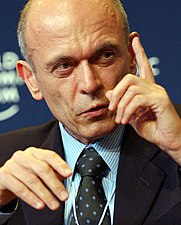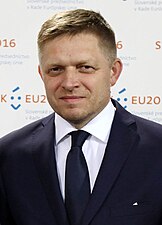Premier of Slirnia: Difference between revisions
No edit summary |
|||
| Line 11: | Line 11: | ||
|incumbent = [[Irena Mesić]] | |incumbent = [[Irena Mesić]] | ||
|incumbentsince = <small> 11 May 2020 </small> | |incumbentsince = <small> 11 May 2020 </small> | ||
|style = Mr/Mrs. Premier<small>(formal)</small><br>{{wp| | |style = Mr/Mrs. Premier<small>(formal)</small><br>{{wp|Premier|Premier}} <small>(informal)</small> | ||
|residence = 551 Prešeren, [[Slirnia|Dražovice, Slirnia]] | |residence = 551 Prešeren, [[Slirnia|Dražovice, Slirnia]] | ||
|seat = [[Parliament of Slirnia]] | |seat = [[Parliament of Slirnia]] | ||
| Line 22: | Line 22: | ||
}} | }} | ||
{{Template:Politics of Slirnia}} | {{Template:Politics of Slirnia}} | ||
The '''Premier of the Republic of Slirnia''' ({{wp|Montenegrin language|Slirnian}}:''Premijer Slirnije'') is the {{wp|Head of Government}} of the [[Slirnia|Republic of Slirnia]]. The | The '''Premier of the Republic of Slirnia''' ({{wp|Montenegrin language|Slirnian}}:''Premijer Slirnije'') is the {{wp|Head of Government}} of the [[Slirnia|Republic of Slirnia]]. The Premier's Office is composed by who presides the office and his or her executive, commonly called Council of Ministers, which is presented by the Premier after gaining the confidence of the Parliament. Since the creation of the office in 15 May 1995, there has been seven Prime Ministers from the min three political parties of Slirnia. The current holder of the office, Milo Jovanović, was elected during the General Elections of 2016 and is leader of the [[Christian Democratic Party (Slirnia)|Sotirian Democratic Party]]. | ||
The position of the | The position of the Premier was created in Slirnia after the 1994 referendum and the first elections to choose the holder of the office for the first administration were held during 1995. Since then, the duties of the Premier have ''de facto'' surpassed those of the collective Slirnian presidency, which was delegated to act as a neutral force, aimed to represent the majority of the population and acting as mediator during political discussions of national matter. Prime Ministers are elected after General Elections when the three members of the [[Presidency of Slirnia|Presidency of Slirnia]] meet the leader of the largest political force, who is supposed to command the confidence of the [[Parliament of Slirnia|Parliament]]. Once with the assent of the Presidency, the elected Premier should present the political programme to all members of the legislature and these should give their confidence or not, in the case of not giving it, the elected Premier will have a second meeting with the Presidency and thee will authorise a new presentation in the Parliament where only a simple majority will be needed to hand in the confidence to the Premier. Due to the process of election, since the creation of the office, coalitions have been a normal way of cabinet functionality, which has eventually led to the politics of Slirnia having a large base of consensus across forces and the political spectrum. The [[Parliament of Slirnia]] has the power to end with government in case of unconstitutionality or after serious events, removing the confidence from the office holder through a {{wp|motion of no confidence}} and asking the Presidency to convoke new General Elections. There is no term length stipulated on the Constitution but administrations in Slirnia are usually of five years maximum, with few exceptions of governments being in office less or more time; for example, Marko Brajović from the [[Social Democratic Party (Slirnia)|Social Democrat]] and Branislav Ivanović from the [[Slirnian Democratic Centre]] governed three years (being the persons with less time in office) and Željko Đukanović from the [[Sotirian Democratic Party (Slirnia)|Sotirian Democratic Party]] being the longest occupier of the office between 2005 and 2012. | ||
==List of Prime Ministers== | ==List of Prime Ministers== | ||
{{main|List of Prime Ministers of Slirnia}} | {{main|List of Prime Ministers of Slirnia}} | ||
===Living former | ===Living former Premiers=== | ||
<gallery mode=packed heights=150px> | <gallery mode=packed heights=150px> | ||
File:Janez Drnovsek.jpg|Branislav Ivanović <small><br>[[Slirnian Democratic Centre]]</small><br> (2000-2003) | File:Janez Drnovsek.jpg|Branislav Ivanović <small><br>[[Slirnian Democratic Centre]]</small><br> (2000-2003) | ||
Revision as of 22:21, 25 May 2020
| Premier of Slirnia | |
|---|---|
| Premijer Slirnije (Slirnian) | |
| Style | Mr/Mrs. Premier(formal) Premier (informal) |
| Residence | 551 Prešeren, Dražovice, Slirnia |
| Seat | Parliament of Slirnia |
| Appointer | The Presidency of Slirnia appoints the party leader who commands the confidence of the Parliament |
| Formation | 15 May 1995 |
| Website | www |
| This article is part of a series on the politics and government of Slirnia |
|---|
The Premier of the Republic of Slirnia (Slirnian:Premijer Slirnije) is the Head of Government of the Republic of Slirnia. The Premier's Office is composed by who presides the office and his or her executive, commonly called Council of Ministers, which is presented by the Premier after gaining the confidence of the Parliament. Since the creation of the office in 15 May 1995, there has been seven Prime Ministers from the min three political parties of Slirnia. The current holder of the office, Milo Jovanović, was elected during the General Elections of 2016 and is leader of the Sotirian Democratic Party.
The position of the Premier was created in Slirnia after the 1994 referendum and the first elections to choose the holder of the office for the first administration were held during 1995. Since then, the duties of the Premier have de facto surpassed those of the collective Slirnian presidency, which was delegated to act as a neutral force, aimed to represent the majority of the population and acting as mediator during political discussions of national matter. Prime Ministers are elected after General Elections when the three members of the Presidency of Slirnia meet the leader of the largest political force, who is supposed to command the confidence of the Parliament. Once with the assent of the Presidency, the elected Premier should present the political programme to all members of the legislature and these should give their confidence or not, in the case of not giving it, the elected Premier will have a second meeting with the Presidency and thee will authorise a new presentation in the Parliament where only a simple majority will be needed to hand in the confidence to the Premier. Due to the process of election, since the creation of the office, coalitions have been a normal way of cabinet functionality, which has eventually led to the politics of Slirnia having a large base of consensus across forces and the political spectrum. The Parliament of Slirnia has the power to end with government in case of unconstitutionality or after serious events, removing the confidence from the office holder through a motion of no confidence and asking the Presidency to convoke new General Elections. There is no term length stipulated on the Constitution but administrations in Slirnia are usually of five years maximum, with few exceptions of governments being in office less or more time; for example, Marko Brajović from the Social Democrat and Branislav Ivanović from the Slirnian Democratic Centre governed three years (being the persons with less time in office) and Željko Đukanović from the Sotirian Democratic Party being the longest occupier of the office between 2005 and 2012.
List of Prime Ministers
Living former Premiers
Branislav Ivanović
Slirnian Democratic Centre
(2000-2003)Marko Brajović
Social Democrat
(2003-2005)Željko Đukanović
Sotirian Democrat
(2005-2012)Aleksandar Keşco
Slirnian Democratic Centre
(2012-2016)Milo Jovanović
Sotirian Democrat
(2016-2020)





